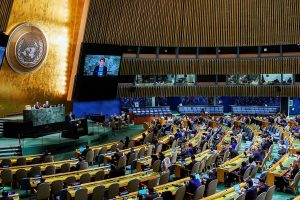
On November 11, the United Nations’ Special Political and Decolonization Committee (Fourth Committee) approved six draft resolutions, one of which will “request an advisory opinion from the International Court of Justice on Israel and the Occupied Palestinian Territory.”
According to the resolution, the Assembly is to “demand that Israel cease all measures that violate the human rights of the Palestinian people,” as well as “have the Assembly decide to request the International Court of Justice to render urgently an advisory opinion on the legal consequences arising from the ongoing violation by Israel of the right of the Palestinian people to self-determination, from its prolonged occupation, settlement and annexation of the Palestinian territory occupied since 1967.”
The UN’s press release also noted that “Israel’s representative … said that calling for the Court’s involvement would decimate any chances of reconciliation between Israel and the Palestinians.” The representative also said that “such resolutions demonize Israel and exempt the Palestinians of any responsibility for their current situation.”
I can understand why the Israeli delegate would urge the delegates of the member states not to approve the resolution although he knew it was a hopeless effort. He is only doing his job.
However, what I think we should really do about this decision is nothing at all. We should ignore it as though it never happened, or we did not hear about it.
The United Nations has been against the State of Israel since day one. This resolution, which purports to decry Israel’s violations of human rights in the areas occupied during the 1967 war, is nothing but a pretext to exterminate the Jewish state one step at a time. This is why in 1955, long before the 1967 war, when Prime Minister David Ben-Gurion was told that the UN would oppose a suggested military campaign in Gaza, he replied, Um shmum (lit. UN [is] nothing).
If, on the other hand, Israel is to respond after all, it must unequivocally state the facts:
1. The one book that all three Abrahamic faiths recognize, the Bible, writes that the Land of Israel is the land of the people of Israel.
2. Every historic evidence ever found supports that the land of Israel was the historic land of our fathers, including, of course, the Temple Mount.
3. There is not one text that mentions a Palestinian people in this land (Philistines are not Palestinians and certainly have no connection to Jerusalem or Judea and Samaria).
4. The name Palestine appeared very late in history: It was given to Judea in the 2nd century C.E. by the Romans after they crushed the Jewish Revolt of Bar Kokhba. By doing so, they attempted to obliterate all traces of Jewish presence in the land, so the Jews would not try to return to it. However, according to Prof. of History Louis Feldman, Rabbi Akiva testified in the second century that Diaspora Jews still referred to the land as Eretz Israel [Land of Israel].
5. If any territorial demands are to be made, then according to what is written in the Bible and what has been found by archeologists, Israel should stretch from the Nile in Egypt to the Euphrates in Iraq.
I have no qualms about whether the world will agree to such demands, but I do think we should stop apologizing. Instead, we should insist on our rights, and—even more importantly—do what we came here to do: unite among ourselves and become a model nation, a nation of solidarity, mutual responsibility, and love of others as ourselves, precisely the legacy of our people.
Our presence in this country does not depend on this or that UN resolution, on the terror of Arabs, or on our sophisticated weapons. Our presence here depends on doing what I just stated—on our internal unity. Through our connection, we will determine not only our fate, but the fate of the world.
This is not my idea, but what our sages have been writing since the inception of our nation. It is something that every Jew feels, even if subconsciously, and that every antisemite feels, as well, even if they do not admit it. This is exactly why the Jewish people conceived the concept of Tikkun Olam (correction of the world) and made it the highest moral goal of a Jewish person. In fact, some Jews define the level of Jewishness by the commitment to Tikkun Olam, although disputes over the meaning of the term are often so deep that they prolong the correction of the world because they hinder Jewish unity.
Antisemites, too, feel that the Jews must correct the world. They may not articulate it to themselves in this manner, though some, like Henry Ford, actually did, but the fact that antisemites blame Jews for the world’s misfortunes implies that they believe that Jews are responsible for what is happening in the world—for better or worse.
To conclude, I do not think that Israel should altogether ignore the latest display of UN antisemitism; I think we should use it as a reminder of the urgency to unite. We need not respond to the actual resolution, but simply do what we must do: unite among ourselves and thereby put an end to our internal problems, to our troubles with our neighbors, and to all hatred around the world, since the world will follow the model nation, as Ford, Shulgin, and other antisemites had hoped to see from the Jewish people.
*For more on how Israel should relate to UN anti-Israel bias, read my latest publication, 𝘕𝘦𝘸 𝘈𝘯𝘵𝘪𝘴𝘦𝘮𝘪𝘵𝘪𝘴𝘮: 𝘔𝘶𝘵𝘢𝘵𝘪𝘰𝘯 𝘰𝘧 𝘢 𝘓𝘰𝘯𝘨-𝘭𝘪𝘷𝘦𝘥 𝘏𝘢𝘵𝘳𝘦𝘥.
#antisemitism #UnitedNations #israel
Posted on Facebook, LinkedIn Newsletter, The Times of Israel